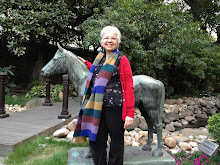“The true purpose of education is to bring the child into his inheritance.” --
Curry, Charles Madison & Erle Elsworth Clippinger, CHILDREN’S LITERATURE. Rand McNally & Company, New York, 1923.
My coveted invitation to a Literary Gala, sponsored by the Arne Nixon Center and Petunia’s Place, included the directive to bring my favorite children’s book. After considering bringing one of my own (only a few seconds, honest!) I realized that my hands-down-all-time-favorite children’s book is my mother’s text book from her children’s literature class at UCLA during the roaring twenties.
This precious book, now too tattered to be repaired, offered student teachers training in literature instruction and many beloved classic stories and poems. Living on a remote cattle ranch in the central California foothills, my brother and I were a half-hour’s hike from the nearest neighbors. When we tired of exploring and arguing we read. Mother borrowed boxes of books from the library. Still, we ran out. Each of us had a favorite book (mine was Little Women Ralph’s, Little Joe Otter), but still we ran out and Mother would hand us Clurry & Clippinger's Children's Literature.
Nonsense poetry entertained us best. The book’s pages of traditional fairy stories and fantastic tales remain intact; poems by Edward Lear, Lewis Carroll and John Towsend Trowbridge are so worn as to be barely legible.
If your childhood was so deprived as to have omitted John Towsend Trowbridge, I must introduce you to his epic poem, “Darius Green and His Flying Machine.” While you read imagine my brother and me building wings from various household items and leaping off furniture while shouting as many of the five pages of rhyme as we could remember.
If ever there lived a Yankee lad,
Wise or otherwise, good or bad,
Who, seeing the birds fly, didn’t jump
With flapping arms from stake or stump,
Or, spreading the tail of his coat for a sail,
Take a souring leap from post or rail,
And wonder why he couldn’t fly,
And flap and flutter and wish and try,--
If ever you knew a country dunce
Who didn’t try that as often as once,
All I can say is, that’s a sign
He never would do for a hero of mine.
An aspiring genius was D. Green;
The son of a farmer,--age fourteen;
That’s about as much of the poem as either of us ever managed to learn, but the joy of the thing makes me giggle sitting here all alone.
Poetry feeds children’s spirits and aids in language development for both native and non-native speakers. Well-chosen poetry provides a uniquely pleasurable language experience while introducing the richness of our western literary heritage. I’m packing my mother’s precious old textbook to share tonight, after I finish reading the rest of these poems. No one will notice if I’m late.
Subscribe to:
Post Comments (Atom)

No comments:
Post a Comment